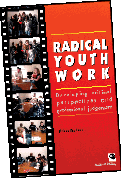 |
Brian Belton
Russell House Publishing/International Specialized Book Services
124 pages. $33.95 paperback.
Are you ready to question everything you know about youth work? Can you risk becoming infuriated or enlightened?
Welcome to the United Kingdom, where they do the same things differently. The first page promises: “The radicalism that this book seeks to provoke is a marked departure from … accepted ways of … interpreting youth work.”
Brian Belton quotes great philosophers one moment, teenagers the next, and then his own revolutionary views. A youth gang member in early 1970s London, Belton became a youth worker and eventually a senior lecturer at London’s YMCA George Williams College, which trains youth workers. Used in his college courses, this book builds a radical theory of youth work, although it is “absolutely not a teaching manual.”
Belton sees the past few decades of British youth work as a government strategy to create a skilled workforce to compete in the world market. Emphasis on psychological development, he says, undermines young people’s “potential as a fresh and vibrant natural resource to reinvigorate and shape society.” It’s “socially regressive” when adults seek to make youth “replicate” us.
Suspicious of practices such as community education and “invasive” interventions, Belton urges youth workers to find new ways to deliver services. Shouldn’t our skill be “attuned to allowing … young people to approach us or be with us?” he asks.
He shares a story from youth worker Amanthi, whose agency funded a computer class. When the girls who showed up knew more than the teacher, they explored wider topics. After one girl’s mother’s friend showed them how she trained guide dogs, these city girls became “buddies” for blind youth on a mountain-climbing trek in Wales. Facing a precipitous drop, one girl froze in fear. Her buddy, who couldn’t see the drop, urged her through it, although she was meant to be his guide.
“That’s more than education,” says Amanthi. “That’s epiphany!”
Some American readers might have difficulty connecting with Belton’s left-wing political analysis of the British system, whose focus on capitalism and “colonial” attitudes toward cultural diversity, he suggests, makes government emphasis on youth workers as educators suspect.
Yet Belton’s cultural sensitivity and reflections on change will resonate: “If I enter a community, I will first look to be changed by and through that community’s cultural expressions.”
Through accounts of his own youth gang culture and his experiences as a youth worker in a tough East London neighborhood, Belton ponders what makes youth work effective. His connection with Milky, a white-haired, autistic boy, becomes emblematic of all relationships between workers and youth. “Milky had in him all he needed to become all he could be. I could not ‘educate’ him or make him ‘better.’ In fact, Milky educated me.”
Belton’s sympathies are with youth, not “the system,” which he deconstructs through reflection on the writings of Ivan Illich, who saw industrial growth and consumerism as destructive to communities, and Noam Chomsky, linguist and critic of U.S. foreign policy.
Some will see Belton’s conclusions as alarmist: Pervasive inequality and poverty have overwhelmed the helping professions, including youth workers. “The club, the project, the youth agency … and the general outlook of youth workers … are no longer appropriate,” he writes. Social work and welfare have cut people off from supportive family and community relationships. Belton asks tough questions: “How do we decide to distribute this help and who to [sic]? Can we help everyone?”
What’s left when governments are unable to control the economy and our well-being? Only “individual action to address injustice, poverty, and so on,” says Belton, and that’s “authoritative information for young people.”
Tania de St Croix contributes a pivotal chapter that examines radical youth work’s scarce literature and history to propose its working definition: informal work with young people, “opposition to capitalism and authoritarianism, belief in equality and respect for the environment, debate and struggle,” critical reflection and fun. Her own youth work incorporates her environmental activism and anarchism, using her “questioning influence” to “enable young people to … care for others and the planet as well as themselves.”
Belton concludes with his own techniques for work with youth that convey mutual trust, companionship and guidance.
In her foreword, Mary Wolfe, principal of Belton’s college, does not recommend reading this “annoying, opinionated, impossible, persuasive, and … sometimes wrong” book cover to cover. It must “be put down to allow us to measure up the arguments against our experience.” It’s radical because Belton “hands back the thinking to where it belongs for each one of us: to the reader.”
Sometimes Belton’s insights are obscured by dense discourse. Whether readers become lost in translation or put off by his criticisms of capitalism, Belton’s claim is true: “If you don’t reconsider your practice, it is likely that you haven’t really read this book.” (503) 287-3093, http://www.isbs.com.

























